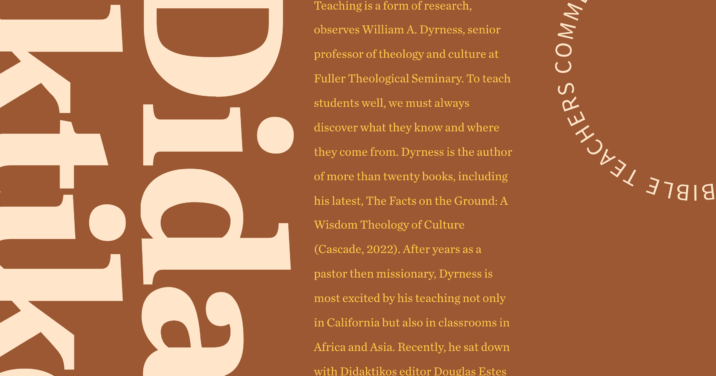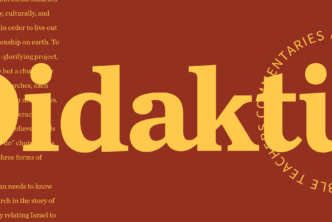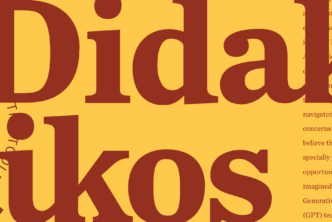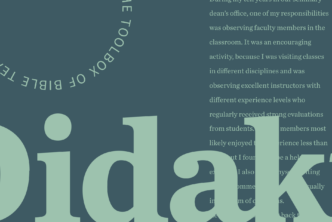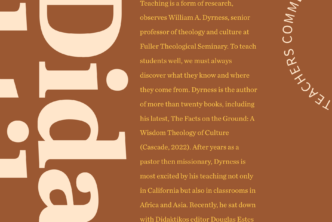Stephen D. Campbell | Aquila Initiative (Bonn, Germany)
In an oral tradition about biblical theologian Brevard Childs, it is said that a student once asked, “Professor Childs, how can I become a better Bible interpreter?” “If you want to become a better reader of the Bible,” Childs replied, “you must become a deeper person.” To a large degree, it no longer matters whether this event happened the way it was described to me. What it communicates is true enough: becoming a deep person—a theologically rich person, for example—helps with the interpretive task in ways that can hardly be overestimated. In practice, the truth of Childs’s comment is likely to be underappreciated more often than not. What is clear, however, is that one of the chief aims of the theological educator is the growth of individuals into deeper people.
John Webster says the same thing of the task of theology generally, but he takes it one step further. “Good theologians,” he says, “are those whose life and thought are caught up in the process of being slain and made alive by the gospel and of acquiring and exercising habits of mind and heart which take very seriously the gospel’s provocation.”1
I believe that theological educators would largely agree with these sentiments; formation in a variety of constructive ways is one of our chief aims. Without exception, however, this formation we foster happens within institutional communities and with certain goals in mind, be they defined ministerially, missionally, academically, or in some other way. For that reason, our topic of the objectives of theological education will lead us to questions of institutional distinctives we will have to address as well. Educators, I have come to believe, should work within the distinctives of their communities and with a passion for the growth and formation of their students. Our vision for theological education is cast far higher than information transfer alone. Some of us focus on the historical or biblical or theological or pastoral formation of students and communities, but all of us are focused on formation.
But to what end? That is the question that my foreign context has forced me to come to grips with in new ways. That is the question I want to challenge us to consider together. I believe our teaching—or at least our pastoral impulses toward students—will be strengthened as we reflect together on how God has been working in another context. I believe that the German system of apprenticeships for secular professions can point us toward a higher vision for education in our religious sphere—a vision that will help us appreciate in perhaps new ways the importance of aiding our students reach their aspirations.
Here in Germany, only a third of German young people attend university. To be precise, the figure was 33.5 percent for 2019.2 The reasons for this are numerous, but they include a school system that separates students into different tiers of high school based on their academic acumen. Only the more academically gifted students are then allowed to take the university entrance exam (called the Abitur). In part this is necessary to protect the educational system—which is largely free of tuition fees at the undergraduate and graduate levels—from overpopulation, which would strain the state’s finances.
A second important reason for this educational approach is rooted in Germany’s centuries-old system of trade guilds. The guilds have always trained their own practitioners. In Germany, these guilds are primarily the craft and labor industries. Roofers, bakers, book binders, electricians, window installers, painters, etc., all have apprenticeship programs to train workers for their respective industries. However, in the German context these apprenticeships (singular Ausbildung, a word often translated into English as “job training”) now include such fields as finance, midwifery, banking, airplane mechanics, real estate, sales, elder care, and many more. Regardless of the field of training, these apprenticeships often include classroom learning as well as on-the-job training with experienced professionals. Importantly, they continue until the apprentice has achieved mastery.
Another important aspect that all apprenticeships have in common is that they are oriented to the end goal. Most North American education has standardized learning pathways (classes, exams, papers, etc.) but nevertheless has unknown learning outcomes. No matter what we tell ourselves, within this model there is no way to guarantee that graduates are competent in their field of study. To put an even finer point on it, a high GPA does not make someone a good pastor. German apprenticeships, on the other hand, have standardized outcomes and tailored pathways. (This is not unlike the curricula found among the growing number of competency-based programs in North America.) No one is allowed to become an incompetent certified electrician; competency is the guaranteed outcome, and the training can be adapted in various ways according to the needs of the apprentice.
This context is important, because it has forced me as a theological educator to have and maintain a clear idea of my pedagogical aims. Am I training professors and academics, or am I training church planters? To illustrate: someone wanting to become a ship builder does not get an apprenticeship with a furniture maker; both use wood and woodworking tools, but the targeted outcome is vastly different. The same is true if we turn our attention to the level of institutions themselves. At this point, we might use the buzz word “institutional distinctives.” Our theological institutions—like the carpentry example—must similarly be clear and consistent on their educational distinctives, for this clarity will help both student and institution thrive.
This is the message of Mark William Roche in his book Realizing the Distinctive University.3 He argues for the importance of institutions focusing on what makes them distinctive and strengthening those areas. They should focus on who they are and be exemplary at that. Are we training boat builders or furniture makers? Are we training pastors or archaeologists? Who are we training, how are we training them, and for what are we training them? Knowing the answers to these questions is foundational to good theological education in a distinctive learning environment. For example, just as a furniture maker would not take on an apprentice ship builder, a Baptist seminary that focuses on training local church pastors should think twice before devoting resources to developing doctoral degree programs. Religion professors at secular, liberal arts colleges should likewise know precisely what makes their departments distinct and aim to thrive within that niche.
These distinctives flow out of an institution’s various affiliations, degree program(s), pedagogical approach(es), geography, human resources, etc. For many of us professors, however, we also will have to work diligently to understand our students’ distinctive goals and aspirations. Should we engage with a student wanting to go into social work the same way we engage with a student wanting to go into academia? Do one-size-fits-all approaches work for these two students? My time in Germany has taught me to answer this question in the negative.
As administrators, do we understand that clarity about institutional distinctives and emphasis on formational education begins with us before it is adopted and implemented by faculty? As instructors, are we advancing and supporting the distinctives of our institutions, or are we apathetic toward—or even working against—our institution’s vision? Educators, I now believe, should work within the distinctives of their institutions and with a passion for the growth and formation of their students toward the students’ aspirations.
By way of conclusion, let me make five suggestions for possible ways these insights might be implemented practically. First, I have already seen a wider and accelerating acceptance and implementation of competency-based curricula across North America. I think this is a positive trend, and I believe institutions should consider developing competency-based degree programs if that fits within their distinctives, not for purely marketing reasons. Pendula swing to their extremes by nature, but I am not here advocating for a total abandonment of more traditional degree programs. Second, my experiences in Germany have led me to believe that institutions and students would benefit from a greater willingness on the part of administrators and professors to tailor curricula to the needs of students. For example, reading assignments can be adapted in response to a student’s interests or abilities, and some essays could be accepted in the form of a podcast, a video, or a public lecture. The aim is competency not uniformity, and pathways can be adapted according to the individual students more easily than you might imagine. Begin by allowing students to make requests or suggestions. Third, my experience has led me to acknowledge that a greater humility is required from professors; we simply cannot develop competency through classroom teaching alone, and we need to accept this limitation. Students need real-world application and will benefit in ways we can never replicate, duplicate, or imitate in the classroom.
This observation leads to my two final applications. Fourth, teachers must manage expectations and help foster patience for students in traditional classroom-based degree programs. Much can be learned in a classroom, but a high GPA does not make someone a competent pastor, counselor, minister, or even scholar. The lion’s share of competency comes through experience, and experience takes time. Finally, institutions could consider developing stronger partnerships with local churches and organizations that will commit to giving students opportunities to learn through meaningful experience. For good reasons, churches are often reluctant to enter such partnerships, but it behooves us to ensure that such partnerships are developed, nurtured, and utilized.
My experiences with the German apprenticeship system have formed me into the kind of teacher that seeks to know my students and to know the end result they are entrusting me to help them achieve. My German context has taught me to see myself as a practitioner training the next generation of practitioners and to journey with my apprentices until they have achieved their goal to become competent church leaders and church planters. This context has taught me about the high calling of theological education, that we are instruments of formation and should do this work with clear aims in mind for each individual student.
Stephen D. Campbell’s (PhD, Durham) research interests include the theological interpretation of Scripture, cultural memory studies, and the book of Deuteronomy.
This article was originally published in Didaktikos: Journal of Theological Education and lightly edited for the Academic Blog. Subscriptions to Didaktikos for faculty at theological institutions or departments are free; sign up here.
- John Webster, The Culture of Theology, ed. Ivor J. Davidson and Alden C. McCray (Grand Rapids: Baker Academic, 2019), 133.
- “Educational Attainment,” Federal Office of Statistics, https://www.destatis.de/EN/Themes/Society-Environment
/Education-Research-Culture/Educational-Level/Tables
/educational-attainment-population-germany.html#fussnote
-1-53432. As low as this number is, it rose sharply in the decade before the beginning of the Covid-19 pandemic in 2020. - Mark William Roche, Realizing the Distinctive University: Vision and Values, Strategy and Culture (Notre Dame: University of Notre Dame Press, 2017).

